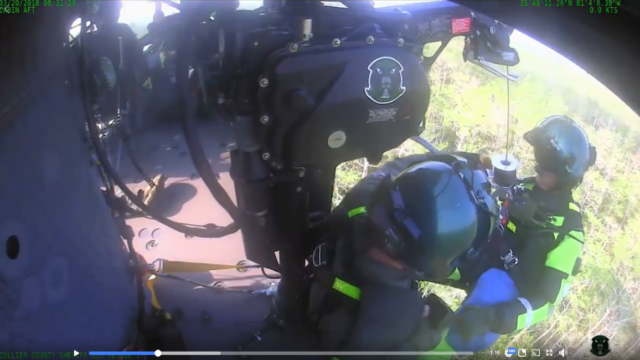
Deputies and dispatchers worked together over the course of 16 hours to help rescue a lost hiker in the Everglades Tuesday.
As night fell Monday evening, the 33-year-old hiker, who was unable to find his way back to a trail he was following off Loop Road, called for help. Dispatchers were able to map his location 4.5 miles east of the nearest road or trail using cell phone data. With the coordinates in hand, a Collier County Sheriff’s Office Aviation Bureau crew located the hiker with infrared sensors on one of its helicopters. However, the area was covered with thick foliage, making a landing impossible.
The agency’s rescue helicopter, a Vietnam-era Huey, also responded to the scene, but the darkness and dense vegetation made it impossible to lower a deputy to rescue the hiker by hoist. CCSO Agriculture Unit deputies, using verbal directions provided to them by the hovering Aviation Unit, entered the swamp on foot in an attempt to reach the hiker. As they slogged forward, the deputies encountered venomous water moccasins. Not wanting to risk the need for multiple rescues, deputies involved in the effort took into consideration the darkness, the rough terrain and the dangerous wildlife and decided to regroup at daylight. Dispatchers told the hiker to stay put and shut off his cell phone to conserve battery power.
Once thick fog had mostly lifted by about 8 a.m. Tuesday, deputies flew the Huey back to the swamp. Dispatchers told the hiker to find dry ground in an area where the canopy was less dense. Once the Huey spotted the hiker from the air, deputies sent a crew member down in the hoist to secure him. Then, both were lifted out of the swamp to safety. The hiker was unscathed.
This rescue was made possible through teamwork, technology and the Huey. This was the first hoist rescue for the Huey since it went into operation at CCSO in November 2017. It was built in 1968. In 1971, it reported for its first tour of duty in Vietnam where it was shot and damaged just one month later. It returned to the U.S. for repairs and entered the fray again first with the Federal Bureau of Investigation, then with the U.S. Border Patrol and finally with the U.S. Customs and Border Protection Air and Marine Operations office.
Eventually, the helicopter was sold and the CCSO bought the surplus craft for $400,000. The agency spent an additional $350,000 to retrofit the craft and train deputies to fly it.
Video by CCSO[/vc_message]












